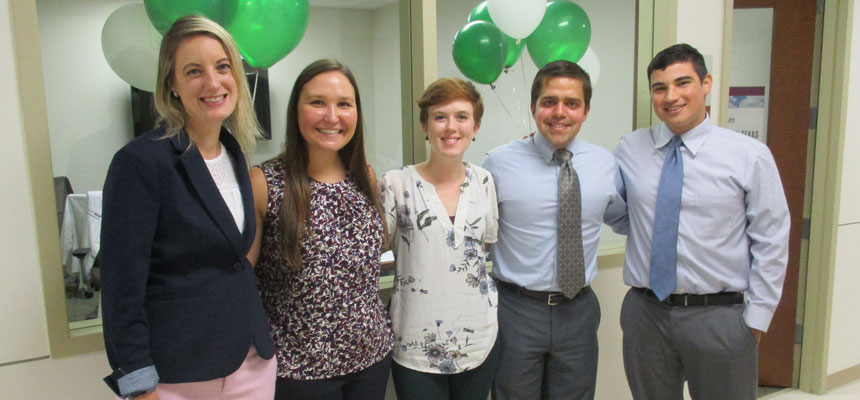UNTHSC rural medicine students finish tops in Texas
By Alex Branch

A team of UNT Health Science Center medical students earned first place at a statewide competition that challenged them to solve rural health challenges with creative ideas.
The winning students were Derek Christensen, Colleen Del Valle, Emily Nelson, Emily Tutt and Tyler Ulmer. They are part of the Texas College of Osteopathic Medicine’s Rural Osteopathic Medical Education (ROME) program. The students will share a $5,000 prize.
Students from seven state medical schools competed Sept. 22-23 at the SHIFT Texas Health Challenges Case Competition at the Texas A&M University Health Science Center.
“ROME faculty and staff are so proud of our students who competed in the statewide event,” said John Gibson, MD, Assistant Dean in the Office of Rural Medical Education. “We appreciate all of our students and our faculty, who are our most treasured resources in the rural program.”
The first annual SHIFT Competition presented students with a theoretical patient case, as well as broader challenges that restrict access to health care in rural communities. Texas earned a D- on the 2018 National Rural Healthcare Report Card and ranks 36th out of 47 states in rural health care based on mortality, quality of life, and access to care.
Common barriers that prevent access to health care in rural areas include lack of nearby health care services and poor access to transportation. The patient case tackled by UNTHSC students involved an older man, who was a fulltime caretaker for his ailing wife, living in a West Texas county that’s twice the size of Delaware.
“Without a nursing home or adult care center in his rural community, he was not able to access health care because he had no one to care for his wife while he traveled to a doctor,” said Emily Nelson, a four-year UNTHSC medical student. “Those are the kinds of challenges you find in rural communities all the time.”
Each team of students presented their solutions to the patient’s medical case and their plans to improve overall health care in rural areas. The UNTHSC students’ plan included leveraging rural residents’ strong sense of community to support health needs and emphasizing health care vocational training to encourage young people to pursue careers in the medical field.
Initiating technical training programs sparks the interest of high school students who may then be encouraged to enter the health care field upon graduation, Nelson said. This training gives them marketable skills and new opportunities.
“These are the people most likely to stay or return to their hometown to care for their community,” Nelson said. “The competition had a lot of interesting scenarios, and we were really excited to finish first.”
Students from Texas Tech University Health Science Center El Paso finished second and the University of Texas Southwestern Medical Center finished third in the competition.






Social media